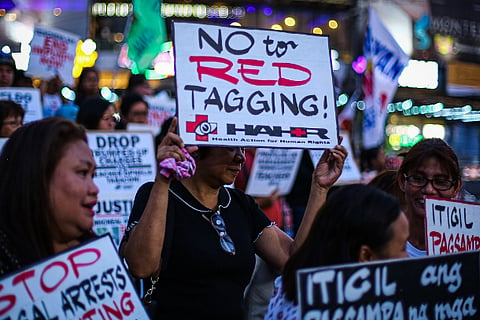
- NEWS
- the EDIT
- COMMENTARY
- BUSINESS
- LIFE
- SHOW
- ACTION
- GLOBAL GOALS
- SNAPS
- DYARYO TIRADA
- MORE

In a landmark ruling for the year 2024, the Supreme Court (SC) declared red-tagging a grave threat to individuals’ life, liberty and security. The court emphasized the dangers of labeling individuals and groups as supporters of the communist insurgency — a tactic often exploited to harass, intimidate, and, in some instances, incite violence against government critics, including physical assault and even murder.
The ruling overturned a 2023 lower court decision that dismissed a 2020 petition filed by activist Siegfred Deduro. Deduro alleged that the Philippine military and anti-communist groups had falsely labeled him as a supporter of the New People’s Army, leading to threats and harassment.
Fearing for his safety, Deduro sought a writ of amparo, a legal remedy that provides protection orders and safeguards for individuals facing threats or harm.
First introduced in 2007 by the Supreme Court, the writ of amparo was designed in response to increasing incidents of red-tagging. It is available to anyone whose right to life, liberty, or security is violated — or threatened — by unlawful acts or omissions, whether committed by public officials, private individuals, or entities. It also covers extrajudicial killings and enforced disappearances, or threats thereof.
The Supreme Court ruled that the trial court that dismissed Deduro’s petition had erred and violated due process. It ordered a summary hearing to retry the case and issue a new verdict.
“Red-tagging, vilification, labeling, and guilt by association threaten a person’s right to life, liberty, or security, which may justify the issuance of a writ of amparo,” the SC stated in its ruling.
Red-tagging, or red-baiting, has long been used by the government in its counterinsurgency efforts, which date back to the late 1960s. This tactic aims to deter potential recruits and sympathizers by publicly labeling individuals or groups as supporters of the insurgency.
Targets have included leaders and members of leftist activist groups, human rights organizations, and religious, Indigenous, and environmental advocates. Red-tagging became more widespread following then-President Rodrigo Duterte’s issuance of Executive Order 70 in 2018, which established the National Task Force to End Local Communist Armed Conflict.
